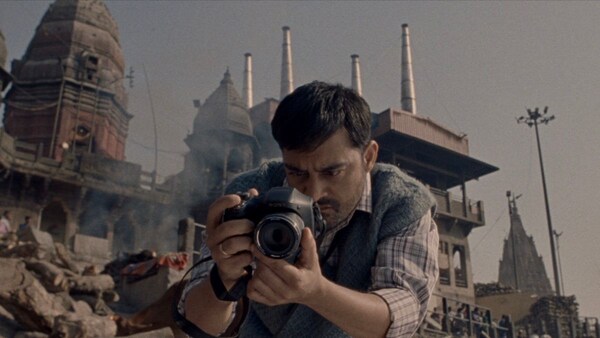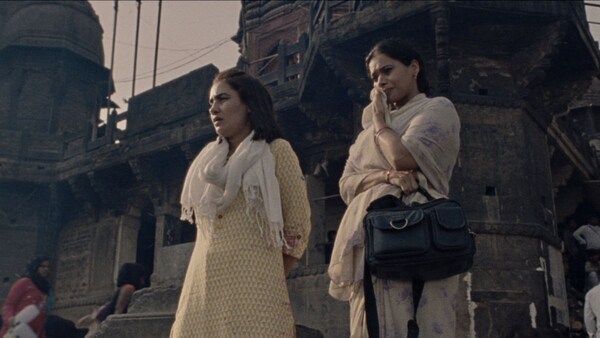Barah By Barah Is A Thoughtful Contemplation On The Permanence Of Change
Barah by Barah not only prods at change but lends a gender and culture import to it which imbues the commentary with gentility.

Last Updated: 07.04 PM, May 28, 2024
IN Gaurav Madan’s Barah by Barah (12X12), change is the only constant. In his contemplative film that shows more than it tells, all the characters are either contesting or waiting for the air to shift, but through it, they are acknowledging the inevitability of it. All of this unfolds in Varanasi, a city so ancient that the more it moves ahead, the more it remains transfixed in time. Madan’s muted outing melds the context with the subtext to frame a story about a group of people who are marching ahead in the hope of finding their feet.
Barah by Barah centres around Suraj (a terrific Gyanendra Tripathi), a married man who earns his living by clicking pictures of dead bodies at the ghat. He lives with his old father, a patriarch stuck in his ways. There is also his wife Meena (an astute Bhumika Dube) whose open-eyed curiosity about the world refuses to be abated by her still surrounding, and their son. All of them, much like the house itself, stand at the intersection of tradition and modernity.
Suraj’s father, unwell and frail, refuses to go to Delhi for treatment. He fears leaving Kashi on his last days will dampen his chance of getting salvation. Meena, on the other hand, extends her hands farther than she was trained to. Apart from taking care of the household chores, helping her son in studies she also stitches sarees and blouses at home. Her ears perk up when she hears someone talk about a new business, she nudges Suraj to start something afresh. There are reasons for it. With digital intervention, his profession is dying a slow death. When dead, people lose their value and then it ceases to matter if a mobile phone is capturing that or a digital camera. Then there is Suraj’s friend Dubey (Akash Sinha) who is fighting a lone fight to stop the demolition of his house. His siblings are buckling under pressure but losing the house would mean to him more than losing a plot of land: it will erase the life he has accrued in the place.

Madan takes these apparent broad strokes, each susceptible to easy resolutions, and crafts them to a compelling culturally-rooted story where the intricate worldbuilding does most of the heavy lifting. Take for instance Suraj's makeshift photo studio (dubbed as ‘Sharma’s death studio’) where, as most workplaces demand, his work comprising headshots of dead people are stuck on it. Or the way Suraj and Dubey’s friendship is built through many nocturnal escapades and visits to brothels with the former accompanying as a show of solidarity. But the set-up also gently underlines the loneliness of someone like Dubey who is in the business of death (he supplies wood for the pyre) and is fighting a lone fight against an inevitable change (we hear Prime Minister Narendra Modi’s voice in news channels talking about a developmental project which is tellingly undercut by journalist Ravish Kumar speaking about it).
In Barah by Barah, little things go a long way. Suraj’s ambition to become a photographer peeks through his persistence to trudge along and click pictures of Meena on the terrace. It becomes both an act of love and a show of craft. Even Meena’s affinity for Mansi (Geetika Vidya Ohlyan), Suraj’s sister who lives in Delhi and is hardly spoken of by the male members of the family, gives a glimpse of her inner life. It comes in bits but soon becomes clear soon that Mansi’s father did not approve of his daughter going to Delhi to study and get a job. His clutching on to tradition was as self-serving as it was prejudice. Later when she does arrive, Suraj is shocked at his sister’s aspiration to drive a metro one day.

Written by Sunny Lahiri and Madan, Barah by Barah not only prods at change but lends a gender and culture import to it which imbues the commentary with gentility. In the narrative it is the men who resist change, it is them whose feet are tied to traditions because patriarchy might burden them but also it lends them a sense of self. But the women move ahead. Both Meena and Mansi embrace the change because they know it is the only way to live a life that has not been envisioned for them by someone else. The film concludes in a bittersweet moment reminiscent of Satyajit Ray’s 1963 film, Mahanagar where the image of two people teaming up against the world is suffused with hope in the midst of a big city. It held up then, it holds up even now.

 Premium
Premium